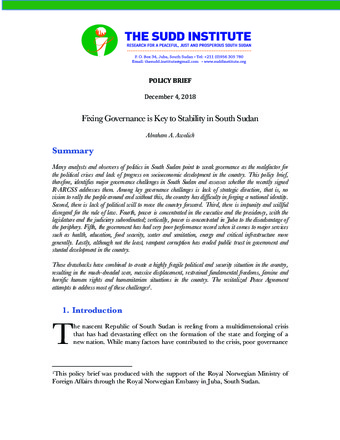Fixing Governance is Key to Stability in South Sudan
Publication Summary
Many analysts and observers of politics in South Sudan point to weak governance as the malefactor for the political crises and lack of progress on socio-economic development in the country. This policy brief, therefore, identifies major governance challenges in South Sudan and assesses whether the recently signed R-ARCSS addresses them. Among key governance challenges is lack of strategic direction, that is, no vision to rally the people around and without this, the country has difficulty in forging a national identity. Second, there is a lack of political will to move the country forward. Third, there is impunity and willful disregard for the rule of law. Fourth, power is concentrated in the executive and the presidency, with the legislature and the judiciary subordinated; vertically, power is concentrated in Juba to the disadvantage of the periphery. Fifth, the government has had a very poor performance record when it comes to major services such as health, education, food security, water and sanitation, energy and critical infrastructure more generally. Lastly, although not the least, rampant corruption has eroded public trust in government and stunted development in the country.
These drawbacks have combined to create a highly fragile political and security situation in the country, resulting in the much-dreaded war, massive displacement, restrained fundamental freedoms, famine, and horrific human rights and humanitarian situations in the country. The revitalized Peace Agreement attempts to address most of these challenges.
Abraham Awolich is the former Managing Director of the Sudd Institute. Awolich’s research has focused on management of development organizations working in conflict mitigation, governance and business management. Awolich is the co-founder of the Sudan Development Foundation and the former Executive Director of New Sudan Education Initiative (NESEI). Previous to joining the Sudd Institute, Awolich helped establish a secondary school in Yei and a medical clinic in Kalthok, Awerial County. Awolich has a Master’s Degree in Pubic Administration from the Maxwell School of Citizenship and Public Affairs at Syracuse University and Bachelor’s Degree from the University of Vermont in Anthropology and Business Administration. Awolich is a McNair Scholar and winner of the prestigious Samuel Huntington Public Service Award in 2006.

